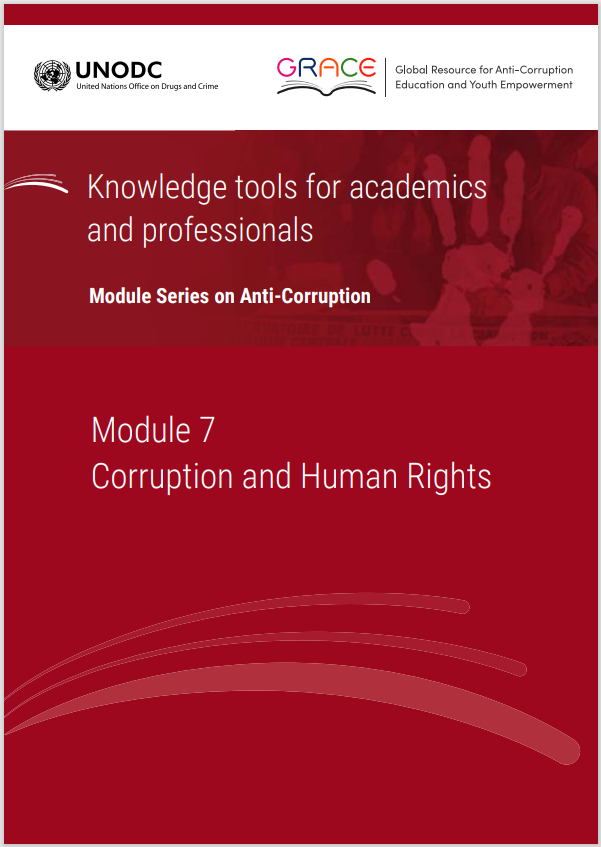This module is a resource for lecturers
Key issues
Corruption exists in all countries, irrespective of the regime type or economic situation. It has significant negative effects on all areas of human well-being and is perceived as one of the major problems jeopardizing economic development, the functioning and legitimacy of government institutions and processes, the rule of law, and the validity of the State itself. Corruption is a complex phenomenon, without a uniform definition. An overview of the different forms and definitions of corruption, as well as its harmful effects across the globe, is available in Module 1 of the E4J University Module Series on Anti-Corruption. For present purposes, it should be noted that the United Nations Convention against Corruption (UNCAC) refrains from providing one overarching definition of “corruption”. Rather, it defines various acts of corruption and classifies them as criminal offences, such as bribery and embezzlement (in both the public and private sectors); trading in influence; abuse of functions; and illicit enrichment (UNCAC arts. 15-22). With 187 States parties (as of April 2020), UNCAC has attracted nearly universal adherence, and the different acts of corruption as defined by the Convention can be considered internationally accepted. Module 4 and Module 5 of the E4J University Module Series on Anti-Corruption include more detailed discussions on how these various acts of corruption manifest in the public and private sectors, respectively.
The concept of human rights is equally complex. Human rights are generally grouped into three categories, also referred to as “generations” to reflect the order in which they were conceived and recognized. “First generation” rights are civil and political rights, such as the right to a fair trial and the right to participate in the political process. “Second generation” rights are economic, social and cultural rights, such as the right to health and the right to education. “Third generation” rights are collective or group rights, such as the right to self-determination and the right to development. The concept of human rights generations is helpful for understanding the impact of corruption on individuals and societies. The grouping of rights into categories or generations, however, does not imply that certain rights are prioritized over others. On the contrary, human rights are considered indivisible and do not have a hierarchical order. This is discussed in more detail on the website of the United Nations Office of the High Commissioner for Human Rights (OHCHR).
The strong link between corruption and human rights violations is emphasized by numerous scholars, practitioners and institutions. Some scholars have studied the correlation between human rights abuses and the spread of corruption (Koechlin and Carmona, 2009, p. 310; Ngugi, 2010; Peters, 2018). This correlation is also echoed by United Nations Global Compact Africa Chief, Olajobi Makinwa: “When there is corruption, human rights disappear” (Transparency International, 2019). Addressing the United Nations Security Council in 2018, the Secretary-General of the United Nations, António Guterres, emphasized that corruption “deprives people of their rights, drives away foreign investment and despoils the environment. Corruption breeds disillusion with government and governance – and is often at the root of political dysfunction and social disunity.” As a result, human rights bodies have been increasingly paying attention to the negative correlation that exists between corruption and the enjoyment of human rights, even if establishing a causal relationship between corruption and human rights violations requires a case-by-case, evidence-based analysis.
The present Module explores a variety of contemporary approaches to understanding and explaining the relationship between corruption and human rights. It begins with a brief background on the human rights system, which will be helpful for exploring the relationship between corruption and human rights. It subsequently provides a general overview of the corruption–human rights nexus, emphasizing the detrimental effects that corruption has on the protection and enjoyment of human rights. The Module next examines in detail several examples of specific human rights that are violated by corruption. This is followed by a discussion of different approaches to assessing the relationship between corruption and human rights. Finally, the Module considers the value of a human rights-based approach to corruption. In this context, it asks whether corruption itself should be considered a violation of human rights, and sheds light on some of the benefits of integrating human rights perspectives with anti-corruption efforts.
The following sections of the module provide an overview of:
- Brief background of the human rights system
- Overview of the corruption-human rights nexus
- Impact of corruption on specific human rights
- Approaches to assessing the corruption-human rights nexus
- Human-rights based approach
- Conclusion
- References
 Next: Brief background on the human rights system
Next: Brief background on the human rights system
 Back to top
Back to top
